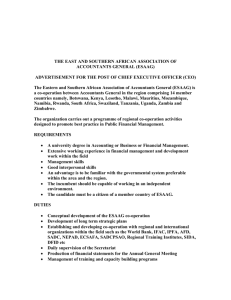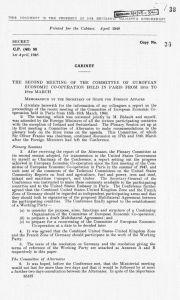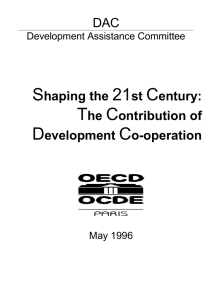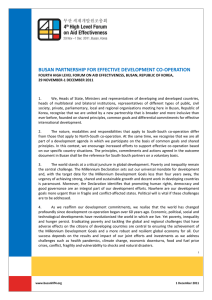Document 10739901
advertisement
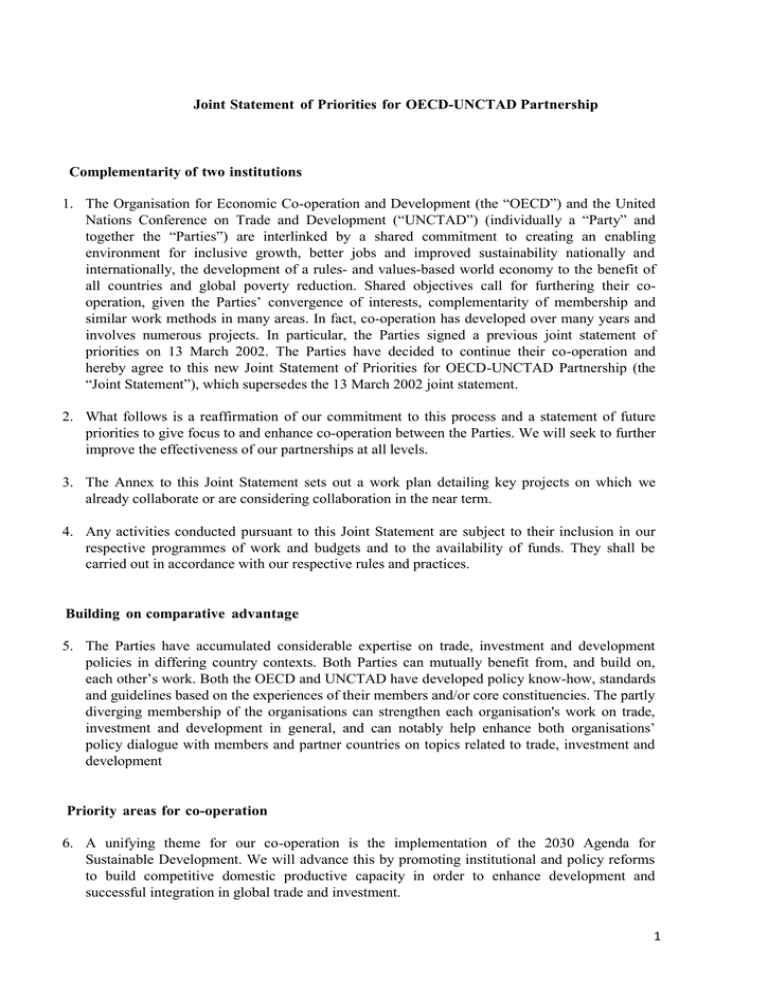
Joint Statement of Priorities for OECD-UNCTAD Partnership Complementarity of two institutions 1. The Organisation for Economic Co-operation and Development (the “OECD”) and the United Nations Conference on Trade and Development (“UNCTAD”) (individually a “Party” and together the “Parties”) are interlinked by a shared commitment to creating an enabling environment for inclusive growth, better jobs and improved sustainability nationally and internationally, the development of a rules- and values-based world economy to the benefit of all countries and global poverty reduction. Shared objectives call for furthering their cooperation, given the Parties’ convergence of interests, complementarity of membership and similar work methods in many areas. In fact, co-operation has developed over many years and involves numerous projects. In particular, the Parties signed a previous joint statement of priorities on 13 March 2002. The Parties have decided to continue their co-operation and hereby agree to this new Joint Statement of Priorities for OECD-UNCTAD Partnership (the “Joint Statement”), which supersedes the 13 March 2002 joint statement. 2. What follows is a reaffirmation of our commitment to this process and a statement of future priorities to give focus to and enhance co-operation between the Parties. We will seek to further improve the effectiveness of our partnerships at all levels. 3. The Annex to this Joint Statement sets out a work plan detailing key projects on which we already collaborate or are considering collaboration in the near term. 4. Any activities conducted pursuant to this Joint Statement are subject to their inclusion in our respective programmes of work and budgets and to the availability of funds. They shall be carried out in accordance with our respective rules and practices. Building on comparative advantage 5. The Parties have accumulated considerable expertise on trade, investment and development policies in differing country contexts. Both Parties can mutually benefit from, and build on, each other’s work. Both the OECD and UNCTAD have developed policy know-how, standards and guidelines based on the experiences of their members and/or core constituencies. The partly diverging membership of the organisations can strengthen each organisation's work on trade, investment and development in general, and can notably help enhance both organisations’ policy dialogue with members and partner countries on topics related to trade, investment and development Priority areas for co-operation 6. A unifying theme for our co-operation is the implementation of the 2030 Agenda for Sustainable Development. We will advance this by promoting institutional and policy reforms to build competitive domestic productive capacity in order to enhance development and successful integration in global trade and investment. 1 7. We renew our commitment to continuing close co-operation in the following priority areas of great mutual interest: development; trade; and investment. Other areas for co-operation 8. In addition to the priority areas listed above, we will seek opportunities to develop further our co-operation in areas either where it is not yet well-established, or indeed is functioning well on an ad hoc basis but could be expanded in the coming years. Examples may include work on competition law and policy, and governance. Staff development and exchanges 9. We are committed to strengthening our knowledge networks, especially by including each other's staff in formal and informal staff development initiatives, continuing to facilitate the participation of staff in high-level events as appropriate, staff exchanges, and participation in technical development programs, subject to separate written agreements. Reviews of progress 10. We will jointly review progress in the above areas, periodically discuss prospects for future collaboration based on such agendas, in Geneva and Paris respectively, and report our findings to our respective members. Mutual access to information 11. We are committed to joining forces to make fuller use of opportunities to make information available electronically to each Party, as well as to different categories of third parties. Examples of such access to information include the involvement and collaboration of both Parties in the Inter-Agency Task Force on Financial Statistics, the Inter-Agency Task Force on International Trade Statistics, or in the preparation of the Agricultural Market Access Database (AMAD). 12. The Parties may disclose to the public this Joint Statement and information with respect to activities carried out under this Joint Statement in accordance with our relevant policies. 13. Any sharing of confidential information between the Parties will be subject to our respective policies and procedures relating to the disclosure of confidential information. Each Party will take any action to protect confidential and/or classified information of the other Party. Intellectual Property 14. We recognise the importance of protecting and respecting intellectual property rights. This Joint 2 Statement does not grant the right to use any work created outside the framework of this Joint Statement, of which one Party is the author or holds the intellectual property rights. 15. Intellectual property rights over any joint work created by the Parties’ collaborative activities under this Joint Statement of which both Parties are the authors will be jointly held by the Parties. Each of the Parties may use and reproduce this work separately, subject to an appropriate acknowledgement of the other Party’s contribution to the work and provided that each Party will seek the written consent of the other before granting any license to a third party. Without prejudice to the above, any joint publication will be subject to a separate written agreement by the Parties. Responsibility 16. Each Party will be responsible for its activities and for its staff members, including for their acts and omissions. In particular, a Party will not be liable for any damage or injury suffered or caused by the other Party or that other Party’s staff. 17. However, if a damage or injury arises out of or results from the actions carried out by one Party (the “First Party”), the First Party will hold the other Party and its staff harmless from any resulting claim or damages. Contact points 18. Individual activity managers in charge of specific work areas for both Parties are indicated in the Annex and remain directly responsible for co-operation in these areas. 19. Mr Joakim Reiter, Deputy Secretary-General of UNCTAD, shall be responsible for the overall co-ordination of UNCTAD’s relationship with the OECD. 20. Ms Mari Kiviniemi, Deputy Secretary-General of the OECD, shall ensure overall co-ordination of the OECD’s responsibilities for the relationship with UNCTAD. 21. For activities related to Investment, Global Governance and G20/G7 and other bodies, Ms Gabriela Ramos is the OECD’s contact point, as well as Mr Andreas Schaal. Entry into Effect and Duration 22. This Joint Statement shall become effective upon signature by both Parties. It shall remain in effect for a period of three years and may be renewed for further periods of no more than three years upon written agreement of the Parties. 23. This Joint Statement may be terminated by either Party by providing three months’ prior written notice to the other Party. In such a case, the Parties will agree, as appropriate, on the steps to ensure that the activities initiated under this Joint Statement are brought to a prompt and orderly conclusion. Divergence of Views 3 24. Any divergence of views between the Parties arising out of or relating to this Joint Statement, including interpretation or application of any provision herein, shall be settled amicably by the Parties. UNCTAD OECD Mr. Mukhisa Kituyi Mr. Angel Gurría Secretary-General Secretary-General Date Date Signature Signature Annex: OECD / UNCTAD Co-operation 4
